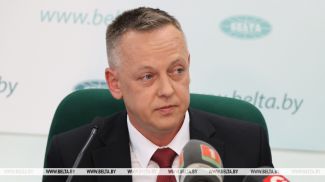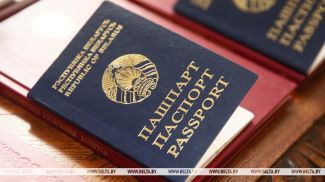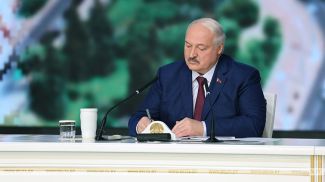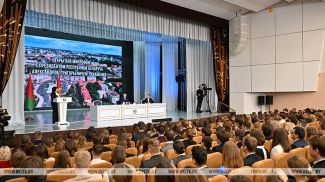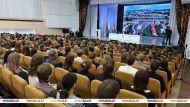BRAGIN, 26 April (BelTA) – The Chernobyl tragedy united Belarusians in their desire to save affected regions, Belarus President Aleksandr Lukashenko said at a requiem meeting on the occasion of the 35th anniversary of the Chernobyl accident, BelTA has learned.
“The Chernobyl accident changed the fates of millions of people. For the Belarusian people it became a national ecological, economic and social disaster,” the head of state said.
In his words, more than a third of radioactive fallout fell on almost a quarter of Belarus' territory – this is almost a quarter of the Belarusian forestry reserves, more than 100 deposits of raw materials and minerals, 265,000 hectares of fertile lands and 340 industrial enterprises. The overall damage made up almost 33 budgets of the republic of the year 1985. As scientists say, we still have to determine the impact of the tragedy on people's health, the head of state added.
“A terrifying expression ‘the exclusion zone' came to our lives. In an instant we found out that we were not allowed to cultivate those lands and reap the harvest, we were not allowed to gather berries and mushrooms because they were dangerous, we were not allowed to swim in those rivers and go fishing, it was dangerous to live in those villages. In the peaceful time we felt the pain from the loss of our native land,” Aleksandr Lukashenko said. Life stopped in almost 500 populated areas, more than 300,000 people lost their homes, the president added.
He recalled that some time ago people from abroad advised Belarus to close the Chernobyl-affected part of the country. “But the Chernobyl tragedy, on the contrary, united Belarusians in their desire to preserve this land, to make us stronger. We recalled a lesson of our fathers and grandfathers: you should never give up, you should never stand on your knees!” the Belarusian leader said. “Therefore, I visit these territories very spring on these memorable days.”
“The Chernobyl catastrophe had a strong impact on my fate and on the fates of people who have gathered together for this requiem meeting. Back then you were thinking about your lives, your future; and I had to think about you, about the country, about the huge territory. The most difficult thing for me was to make a decision that we will not abandon these territories. As a person and as president I was doing my best to convince you that we cannot give up on these beautiful lands,” the Belarusian leader concluded.
In his opinion, the time proved that the decision had been right. “We made the right decision not to give up on these lands. And today I am happy to meet with people whom I met 25 years ago (back then they were young people, now some of them are over 80), I am happy that they are alive. It shows that the decision of yours and of your president was right.”
“We will do our best to restore populated areas (not only district capitals, but also villages and agrotowns),” the head of state assured and mentioned Bragin as an example. In his words, it is essential to continue the development of these territories. “People will live here, and they will live well. We will do our best for it,” Aleksandr Lukashenko stressed.
“Even in the poor 1990s we found money to support Chernobyl-affected people. We found money for recuperation and construction of new houses for them, for scientific research and opening of specialized medical centers, for the restoration of polluted regions,” he continued.
Five national programs to restore Chernobyl-affected territories were implemented in Belarus. “By cleaning meadows, beautifying towns and villages, creating modern infrastructure, we were bringing one hectare of land after another back to life. Today we witness the decreasing number of populated areas where the permitted level of radioactive pollution is exceeded. But the main thing is that we produce good foodstuffs. People live there, make families and give birth to children,” the president said.
He praised the efforts to restore the Belarusian Polesye. At the same time, the head of state remarked that a lot of work is still ahead. In particular, it is essential to prepare a new program with a focus on opening enterprises and creating new jobs in affected regions. According to the president, agribusiness and the forestry industry seem to be the most promising branches. “The time has chosen us, and we must do our best to restore these lands. And you know that such things as the development of the region, the creation of conditions for the life and work of people are always and will always be on my radar,” Aleksandr Lukashenko stressed.
“I know for sure that together we will cope with these tasks. In the near future we will do our best to leave a mark of the man-made disaster only in historical chronicles and in honoring the memory of liquidators,” the Belarusian leader emphasized.





